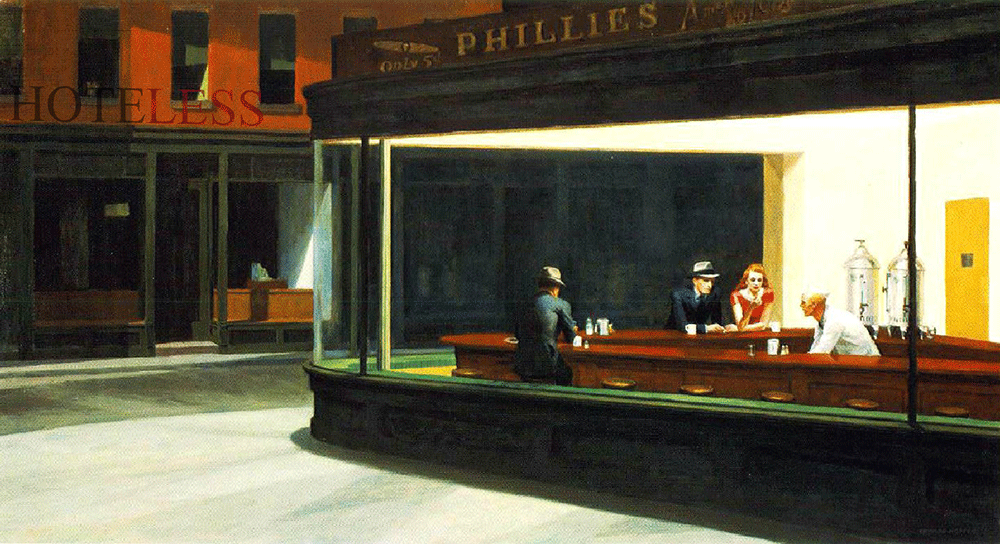Who are you? Could you tell me a bit about your past to put the project in context?
We’re a combined team that approaches projects from the standpoint of architecture and from the so-called social sciences.
In my case (Francesc Pla), I come to this adventure as an architect and an educator. Daniel and I have seen many projects grow, envisioned from this combination and we are very interested in it as a method but, above all, because of the tangible results.
In my case (Daniel Cid), I’ve been working at Elisava for the past 16 years, from 1999 to May 2015, with responsibilities in academic direction and research, while also sharing the class on habitat with Francesc. It is these deep ties to university education that have led me to defend design and architecture schools as places for critical reflection and action against the world we live in, to improve it. Hoteless was created with precisely this spirit.
How did the Hoteless project come about? When did it go from being a concern in your minds to a tangible proposal?
Over the past three years that Francesc and I have co-taught the habitat class at Elisava, we’ve given our students a project on homelessness in collaboration with the Arrels Foundation. Working like that, with real clients, means creating real learning situations. But, above all, tackling these topics, bringing Arrels’ knowledge of homelessness to the classrooms where we talk about housing, has been a way of understating habitat as the beginning and a conditioning factor for all activity. Think that for the homeless, their house is the street. They lay out their privacy until they become invisible in public space.
Think that a home for these people is putting themselves at ground level and starting to talk about the bare essentials. The homes we work on are well ventilated, so domestic life doesn’t get stuck on the furniture or the decoration, it looks at what makes a home a home. This collaboration between the school and the group of activists has led to many interesting proposals, and one of them was the Zero Flat, which will be created in November. It is a pilot flat for Arrels designed by some of the professors and students at Elisava in the Raval district to be used to give people without a roof over their heads, one to sleep under for the night.
What exactly, from a practical standpoint, is Hoteless? What phase is the idea in and what will be implemented in reality, beyond the experiment?
After this experience, the Arrels Foundation entrusted us with the challenge of creating a new hotel service taking into account the problem of homelessness. It is one of the first steps to start laying out future scenarios in the city of Barcelona that take into account the opinions of those who don’t have a place to live. For this, we set our students the exercise of participating in eme3, a festival aiming to rethink architecture from the people’s view.
Could you tell me a bit more about this “combined operation” between tourism and homelessness?
A hotel room is a temporary home for tourists and visitors that doesn’t have a living room or a kitchen, giving people the opportunity to spend a few days free of the responsibility of sharing or receiving visitors. Some people have no option but to live in cheap hotel rooms, but the worst thing is that some don’t even have that choice. The idea is to combine the needs of the former and those of the latter. Giving one of the many visitors to Barcelona the opportunity to book a hotel room with the condition that they are also helping the homeless.
How? This is the challenge we set our students. We don’t want it to just be a monetary donation. We also want to build some sort of mutual understanding between the parties involved. Tourists and homeless citizens, for various reasons, spend their days on the street avoiding each other. Why not create a meeting place and for it to be the hotel room? A domestic debate that helps rethink what type of city model we want. In Barcelona, tourists tend to be criminalised but the true problem is the out of control preying on public space by the business of tourism. Having this business, which is essential to the city’s economy, close ranks with the city also makes it more sustainable socially.
What conditions would there have to be for the project to get the green light? Do you think the situation is more favourable with the new municipal corporation in Barcelona that, in principle, is more sensitive to the issue of housing?
There are nearly 3,000 people living on the street in our city! This should be on the agenda of anyone involved in governing this city. In any case, you said it, the current mayor has a background in a social movement that advocates for decent housing as a right, not a consumer good.
You say that Hoteless proposes normalising the inclusion of the homeless and accepting that this is not just a matter of aid. Don’t you think the greatest obstacle is that society looks at this issue more in terms of charity than social justice? Doesn’t it complicate matters to force us to face many of our society’s meanest values, as you propose?
Here, those who teach us a lesson are those at Arrels. The way they work is to accompany the homeless, respecting their pace, without imposing their rules, fostering participation and decision-making as part of the improvement process. At Arrels, the technicians contribute just as much as the volunteers or the homeless people. In fact, there are people on the Arrels management team who have lived on the street.


